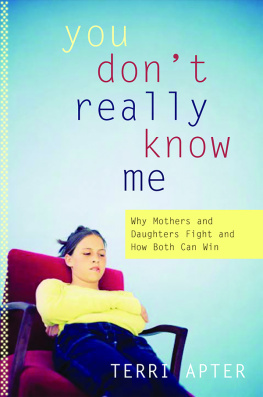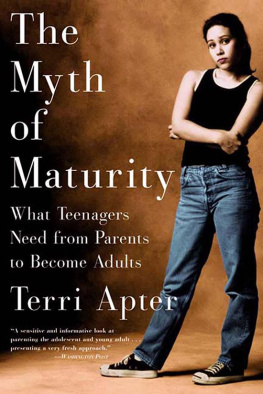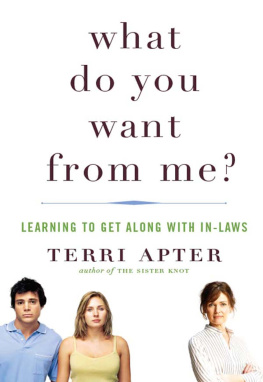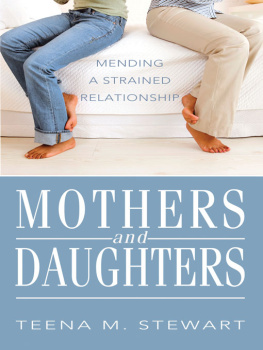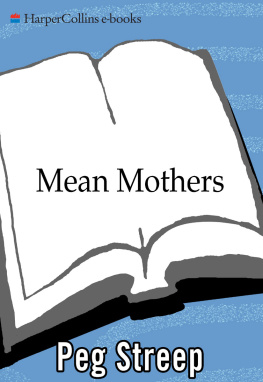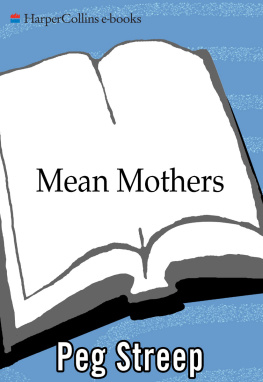
YOU DONT
REALLY KNOW ME
Why Mothers & Daughters Fight and How Both Can Win
TERRI APTER

To Miranda & Julia
You Dont Really Know Me
THERES NO POINT trying to explain.
You wont understand.
You dont know me.
You dont have a clue who I really am.
A teenage girl spits these words through her tears and slams the door. The mother is hurt and outraged: How can her daughter say such things? Not know her! Shes known her since the day she was born. She learned to read her feelings from the tiniest movements of her face and body. She interpreted her early half-formed words. She grew expert at identifying, and then anticipating her daughters wishes and needs. Who dares now to cast that rich history aside? Where is the love that they both, so recently, took for granted?
What an ungrateful, spiteful daughter she has!
At the same time, she knows her daughter has a good heart, and she asks herself: What have I done wrong? What have I done to make my daughter hate me?
The womans best friend, to whom she confides, explains: Its not you. Its just a phase. Shes being a typical teenager.
This reminder is reassuring, but only temporarily. Day to day, face-to-face, her daughter speaks to her a strange language. Whatever teen tribe her daughter now belongs to, her mother longs to understand the particular meanings this particular girl utters, but her attempts at interpretation are met with sneers.
Nothing shakes a womans confidence in her mothering skills as does the onset of her childrensand in particular her daughtersadolescence. The love that once was bedrock now seems fragile. The communication that once flowed easily, with words, glances, and touch, now is diverted through rough channels. The aim of this book is to chart this difficult terrain, so that mothers can follow the changes in a daughters needs and responses.
The Long Road to Understanding
My first lesson in mothers dread of a daughters adolescence came long before I became a teenager. My mother was brooding over the fate of a neighborhood girl who, in her view, was heading for trouble and her mother couldnt do anything about it.
Doesnt her mother tell her what to do? I asked, confident that maternal wisdom would set her right. Shes a teenager, my mother replied. In response to my blank look, she explained, When youre a teenager you wont listen to a word I say.
The world beyond my mothers convictions was a world without intelligence or meaning, and she was telling me that one day I would actually choose to dwell there. Aghast at the vision of this catastrophic and unprotected landscape, I demanded: When will I be a teenager?
She raised her chin thoughtfully to look at some future which seemed to be residing just above my eye level. When youre fourteen, she concluded crisply.
Wont you still tell me things? I pleaded.
Oh, Ill try, she replied, but you wont listen.
She was right, of course, in her fashion. Her version of our quarrels was that I didnt listen to anything she said. In her view, I was swallowed up by the calls of adolescence. I lost a childs concentration on a mothers rules and values. I lapsed into a world of my own enthusiasms and insecurities. I liked my music more than hers. I cared about hair more than homework. I remembered every detail of my girlfriends new outfit but nothing of the shopping list she had entrusted to me.
In her view, I was following the typical teenage syndrome by rejecting her standards, rules, and wisdom. I was, in her view, endangering myself through my poor judgment. She saw me gripped by the power of my peers and hormones, and out of her control. Her fury was a measure of her fear.
While she saw me as a teenage rebel, I saw our battles in a different light. I longed for her recognition of a new me, of a person who sparkled with ability to set her own standards and mark her own goals. While my mother mourned the loss of her obedient child, I longed for her recognition of the new thoughts and aims that were engineering my development. Her prediction, You wont listen to a word I say, became my complaint: You dont listen to a word I say. So frightened was she of our differences that she saw only dangerous rebellion and was deaf to my pleas for recognition.
What, after all, did she want for me? Like most mothers, she wanted her daughter to be an independent person, self-motivated and self-directed. What did I want from her? I wanted to keep that significant bond between us, but to make room to develop according to my own lights. I wanted her to applaud this new development. In that sense I was, and would long remain, her very own daughter. So I continued to terrify her by my difference, even as I longed for her approval and pride.
When the battles subsided, her version was that she had won: I was no longer set against her because I was more grown-up. I could manage myself, both in day-to-day routines and in long-term planning. My version was that I had won: She acknowledged that I could think for myself, that I should be trusted to do what I wanted, and that, on the whole, she would be pleased by the results. Each of us kept our prejudice about the teenage conflict and resolution. Why reflect too much upon a war that was over?
It was when I had daughters of my own that my need to understand adolescence took on a new urgency. My nine-year-old daughter was helping me prepare for a day in the city. She chose the shirt to go with my suit. She checked my handbag, and commented on my hair. Having looked me over and decided I was ready to catch the train for my meeting, she said, When Im a teenager, Ill be able to go with you.
Oh, when youre a teenager you wont want to go into the city with me, I predicted casually, treasuring the fleeting moments of her admiration. I saw the anticipation leave her face, which now wore a film of confused horror. Why? she demanded, tearful at this image of a future self with which she now had so little in common. And there it was, the old formula of teenage development, rolled up like a diploma my mother had handed me and which I was preparing to pass on to my daughter.
Psychological theories of adolescence have not changed much in the course of these three generations. Teens are still monsters, hell-bent on rejecting their parents. It was at that moment I decided that the formula should be cast aside, that a new look at adolescence was necessary, and that I had my new project waiting, a gift my daughter gave me in exchange for the tired, destructive ideas I had tried to hand over to her.
The Study
I began research on adolescent girls and their mothers in the mid 1980s. In 1990, Altered Loves: Mothers and Daughters During Adolescence was published, based on a series of interviews and observations of thirty-six mother/daughter pairs. This book was among the several publications that challenged the long-held assumption that rejection of parents was the key feature of adolescence. Along with other researchers, I noted the importance of continuity and change in parent/child relationships. Girls, perhaps more markedly but not in total contrast to boys, put relationships in a central position, and developed within them. This counters the traditional theory that teenagers develop by separating from parents, but it does not explain why the bond comes under such tension during the teenage years.
The mother/daughter drama is constantly being played before our eyes, and yet its plot lines are difficult to see. During the past half century, it has generally been seen as a tussle between a girls fight for freedom and a mothers urge to hold her back. Clinical reports of psychiatric patients frequently use the language of blame: Mothers are described as engulfing, controlling, intrusive, enmeshed, seductive, unempathic, distant, or depleted.
Next page
